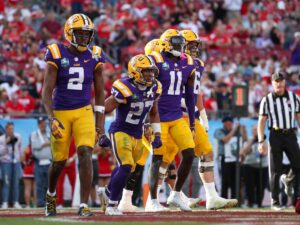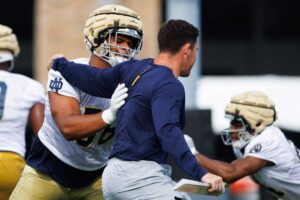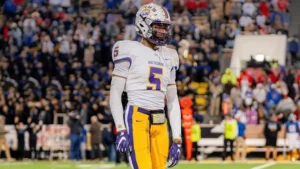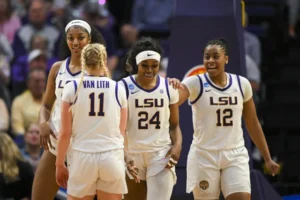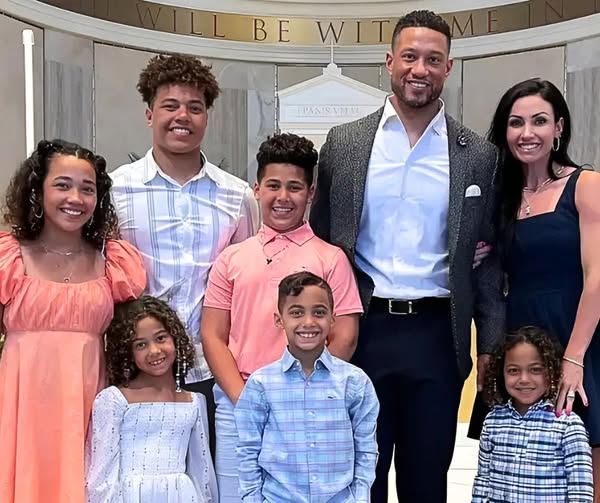
Marcus Freeman’s Greatest Balancing Act: Coaching Notre Dame and Raising Six Kids
When the final whistle blew on Notre Dame’s annual Blue-Gold Game, most eyes turned toward the quarterback competition, the new recruits, and what the performance might signal for the coming season. But for Marcus Freeman, Notre Dame’s 38-year-old head football coach, the postgame thoughts turned to something far more personal — a different kind of team, and perhaps the more demanding one: his family.
In a candid appearance on the See Ball Get Ball podcast with David Pollack, Freeman peeled back the curtain on what it’s like to lead one of the most iconic programs in college football while also raising six kids. And his confession was both surprising and refreshingly honest.
“Being a dad to six is harder than being a head coach at Notre Dame,” he said with a smile — but there was no hesitation in his voice.
That moment of vulnerability, a rare trait in the hyper-competitive world of college football, illuminated a side of Freeman that most fans don’t see on game day. Yes, he’s intense on the sidelines. Yes, he’s strategic in the film room. And yes, he’s determined to bring Notre Dame back to the top of the college football world. But at his core, Freeman is a father — and it’s that role that challenges and fulfills him more than any national title ever could.
The Pressure of the Program
Notre Dame football isn’t just a job — it’s a legacy. With 11 national championships, countless All-Americans, and a fan base that spans generations, the pressure to perform is unrelenting. When Freeman took over the program in December 2021, he stepped into a position once held by legends like Lou Holtz and Knute Rockne. Expectations were sky-high, and every decision would be scrutinized not just by the media, but by alumni, boosters, and fans from coast to coast.
“It’s one of the most visible jobs in sports,” says ESPN college football analyst Kirk Herbstreit. “You’re not just coaching football — you’re managing tradition, expectation, and the weight of a brand that means something far beyond the scoreboard.”
And yet, Freeman embraced the role. A former linebacker himself, with stints coaching at Cincinnati and Purdue, he brought a modern, player-first mindset to South Bend. He speaks the language of today’s athletes, connects with recruits in authentic ways, and has already made strides in elevating Notre Dame’s profile on the field and on the recruiting trail.
But as intense as Saturdays are in South Bend, it’s the chaos of Monday through Friday at home that really tests him.
Six Kids, One Mission
At home, Freeman is just “dad.” And “dad” comes with a different kind of playbook. His children range in age and personality — from teenagers navigating high school to younger kids who still want bedtime stories and one-on-one attention. The household is, in his words, “beautifully chaotic.”
“Coaching is hard,” Freeman said on the podcast. “But at least in the locker room or in the meeting room, you can speak and there’s a level of structure. At home, I might say something, and it’s like — ‘okay, sure, Dad.’”
There’s no whistle to blow when kids argue over screen time. No instant replay to review the fairness of a bedtime. No assistant coach to help manage carpool. And despite all his experience managing large groups of young people, Freeman says parenting six kids is a constant lesson in humility.
“There’s no playbook for it,” he says. “You just try to be present.”
That word — present — is where the heart of Freeman’s parenting philosophy lies. He admits that in the early days of his career, he struggled with separating the intensity of work from the needs of home. But over time, he’s realized that presence isn’t just physical — it’s mental, emotional, and spiritual.
“If you go home and you’re physically there but mentally you’re not, then you’ve failed your kids,” Freeman says.
That intentionality has become a guiding principle. Whether it’s making time for one-on-one moments, bringing his kids to practice, or carving out family dinners amid a recruiting frenzy, Freeman is committed to making his family feel like they’re not just along for the ride — they’re part of the journey.
Blending Two Worlds
One of Freeman’s innovations as a coach has been integrating his two roles rather than separating them. His players know his kids by name. His kids visit the team facilities. There’s crossover, and it’s by design.
“They see each other as part of my life, and that matters,” Freeman explains. “My players know I’m a dad. My kids know I’m a coach. And I want both groups to know that they’re deeply important to me.”
This fusion of roles creates a unique culture. Players see their coach modeling fatherhood in real time, showing them that vulnerability and leadership can coexist. And Freeman’s kids grow up seeing the work it takes to lead — the discipline, the communication, the sacrifice.
It also keeps him grounded. When a tough loss happens on Saturday, Sunday morning comes fast — and there are pancakes to be made, school projects to help with, and rides to church or wrestling practice.
“I can’t dwell too long on wins or losses,” he says. “My kids need me to show up — not as Coach Freeman, but as Dad.”
A Moment of Pride
In the midst of this balancing act, there are moments that remind Freeman why it’s all worth it. Recently, his son Vinny committed to Cornell University on a wrestling scholarship — a milestone for any parent, and a point of pride for the Freeman household.
Freeman joked that the final say in Vinny’s recruitment came from his wife, Joanna — the “real head coach” at home, as he puts it with a laugh. But beneath the humor is deep pride and emotion. Watching his son achieve something through hard work and perseverance — in a sport that demands as much mental grit as physical strength — was a full-circle moment.
“It was special,” Freeman says. “You pour so much into your kids, and when you see them start to chase their own dreams, it’s the best feeling in the world.”
Leadership, On and Off the Field
What sets Freeman apart is not just his ability to lead a football program, but the way he brings the same energy and principles to his home life. Whether it’s teaching his players to be accountable or his kids to be kind, the message is consistent: progress over perfection, character over clout.
He preaches it in team meetings and models it at the dinner table. And even though the days are long and the responsibilities endless, Freeman believes the roles fuel each other.
“Being a dad makes me a better coach,” he says. “And being a coach challenges me to be a better dad. They sharpen each other.”
It’s a dynamic that reflects a broader truth — that leadership is not confined to boardrooms or stadiums. It’s in the quiet moments, the unseen sacrifices, the steady presence during life’s chaotic in-betweens. Freeman may be chasing championships, but he’s also trying to raise good people. And that’s a legacy any team would be lucky to have.
Looking Ahead
As Notre Dame heads into another high-stakes season, the scrutiny will only intensify. The quarterback race will dominate headlines. Every play call will be debated. Every win and loss dissected. But for Freeman, the goal remains constant: lead with purpose, both at work and at home.
He knows the balance will never be perfect. But maybe that’s the point.
“There’s no such thing as perfect balance,” Freeman says. “There’s just effort. Consistent effort.”
And that’s exactly what he brings — whether it’s drawing up a game plan or helping with math homework. Whether he’s addressing the media or picking up pizza on the way home from practice. Whether he’s rallying his team before a big game or sneaking in a bedtime story for the youngest before they drift off.
Marcus Freeman may wear many hats. But at the center of them all is a man trying to show that success isn’t just measured in wins, but in how well you show up for the people who matter most.
